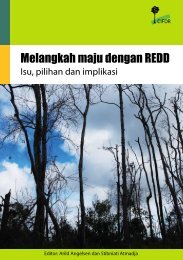Adaptive collaborative management of community forests in Asia ...
Adaptive collaborative management of community forests in Asia ...
Adaptive collaborative management of community forests in Asia ...
You also want an ePaper? Increase the reach of your titles
YUMPU automatically turns print PDFs into web optimized ePapers that Google loves.
150 • Eva Wollenberg, Ramses Iwan, Godw<strong>in</strong> Limberg, Moira Moeliono, Steve Rhee and Made Sudana<br />
We found that small but <strong>in</strong>crementally significant achievements <strong>of</strong>ten<br />
occurred because <strong>of</strong> fortuitous circumstances, such as a chance meet<strong>in</strong>g<br />
with an <strong>in</strong>fluential person, a co<strong>in</strong>cidence <strong>of</strong> <strong>in</strong>terests among key actors, an<br />
unexpected event provid<strong>in</strong>g an opportunity for <strong>in</strong>fluence. These co<strong>in</strong>cidences<br />
became as important to achiev<strong>in</strong>g our objectives as our purposeful activities.<br />
We learned to <strong>in</strong>crease the possibility for these opportunities by becom<strong>in</strong>g<br />
more aware <strong>of</strong> and monitor<strong>in</strong>g changes <strong>in</strong> the follow<strong>in</strong>g factors that were<br />
the key determ<strong>in</strong>ants <strong>of</strong> spontaneous cooperation <strong>in</strong> Mal<strong>in</strong>au:<br />
• the ‘gatekeepers’ (the people with authority, <strong>in</strong>fluence and control)<br />
and the ‘movers and shakers’ (those who could short-cut the<br />
bureaucracy and get th<strong>in</strong>gs done, such as the district leader, agency<br />
heads and village leaders);<br />
• the tim<strong>in</strong>g <strong>of</strong> rout<strong>in</strong>e and ad hoc gather<strong>in</strong>gs and events; and<br />
• the <strong>in</strong>terests that motivated different groups to participate <strong>in</strong><br />
different events.<br />
In addition, we learned to work with this spontaneous cooperation <strong>in</strong> three<br />
ways.<br />
Be<strong>in</strong>g physically present and <strong>in</strong>teractive. Just by be<strong>in</strong>g around we<br />
<strong>in</strong>creased the opportunities for (1) <strong>in</strong>formal meet<strong>in</strong>gs with gatekeepers,<br />
which tended to be more effective than structured formal meet<strong>in</strong>gs; (2)<br />
relationship build<strong>in</strong>g with a wide network <strong>of</strong> people, especially the support<br />
network <strong>of</strong> the gatekeepers (see below) to ga<strong>in</strong> knowledge <strong>in</strong>formally and<br />
build mutual trust; and (3) other people to come to us with <strong>in</strong>formation<br />
they thought we needed to know, <strong>in</strong>clud<strong>in</strong>g <strong>in</strong>vitations to events, news<br />
<strong>of</strong> sudden schedule changes, their understand<strong>in</strong>g <strong>of</strong> hidden motives or an<br />
alternative <strong>in</strong>terpretation <strong>of</strong> an issue.<br />
Work<strong>in</strong>g <strong>in</strong>formally with the support network <strong>of</strong> the gatekeepers. The<br />
gatekeepers themselves were <strong>of</strong>ten too busy to <strong>in</strong>teract with us very much,<br />
but their support network—the people whom advised or <strong>in</strong>fluenced the<br />
gatekeepers—knew and organised schedules and had the latest <strong>in</strong>side<br />
<strong>in</strong>formation about decisions.<br />
Ma<strong>in</strong>ta<strong>in</strong><strong>in</strong>g hyperflexibility <strong>in</strong> our schedule and resources. We learned to be<br />
ready to reschedule our own events and reallocate staff at the last m<strong>in</strong>ute to<br />
attend events, as well as rout<strong>in</strong>ely adjust our strategy. An important way <strong>in</strong><br />
which ma<strong>in</strong>ta<strong>in</strong>ed flexibility was to reduce our dependence on gatekeepers.<br />
Although this flexibility led to some significant ga<strong>in</strong>s, ma<strong>in</strong>ta<strong>in</strong><strong>in</strong>g it was<br />
the most difficult, costly and frustrat<strong>in</strong>g aspect <strong>of</strong> facilitation. It required
















